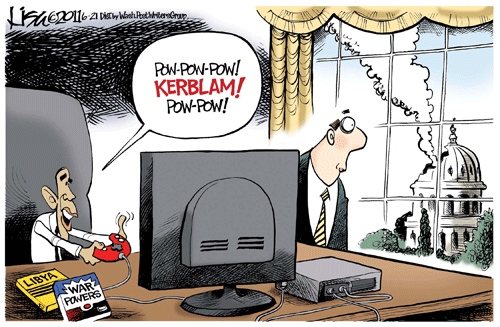“Punting the Pundits” is an Open Thread. It is a selection of editorials and opinions from around the news medium and the internet blogs. The intent is to provide a forum for your reactions and opinions, not just to the opinions presented, but to what ever you find important.
Thanks to ek hornbeck, click on the link and you can access all the past “Punting the Pundits”.
Eugene Robinson: Obama Is Wrong on War Powers

Let’s be honest: President Barack Obama’s claim that U.S. military action in Libya doesn’t constitute “hostilities” is nonsense, and Congress is right to call him on it.
Blasting dictator Moammar Gadhafi’s troops and installations from above with unmanned drone aircraft may or may not be the right thing to do, but it’s clearly a hostile act. Likewise, providing intelligence, surveillance and logistical support that enable allied planes to attack Gadhafi’s military-and, increasingly, to target Gadhafi himself-can only be considered hostile. These are acts of war.
Yet Obama, with uncommon disregard for both language and logic, takes the position that what we are doing in Libya does not reach the “hostilities” threshold for triggering the War Powers Act, under which presidents must seek congressional approval for any military campaign lasting more than 90 days. House Speaker John Boehner said Obama’s claim doesn’t meet the “straight-face test,” and he’s right.
New York Times Editorial: Wal-Mart Wins. Workers Lose.
Wal-Mart Stores asked the Supreme Court to make a million or more of the company’s current and former female employees fend for themselves in individual lawsuits instead of seeking billions of dollars for discrimination in a class-action lawsuit. Wal-Mart got what it wanted from the court – unanimous dismissal of the suit as the plaintiffs presented it – and more from the five conservative justices, who went further in restricting class actions in general.
The majority opinion by Justice Antonin Scalia will make it substantially more difficult for class-action suits in all manner of cases to move forward. For 45 years, since Congress approved the criteria for class actions, the threshold for certification of a class has been low, with good reason because certification is merely the first step in a suit. Members of a potential class have had to show that they were numerous, had questions of law or fact in common and had representatives with typical claims who would protect the interests of the class.
When Pendleton, South Carolina, Mayor Randy Hayes rose to address the question of whether the US Conference of Mayors should back an antiwar resolution urging the president and Congress to “speed up the ending” of wars in Iraq and Afghanistan, the assumption might have been that he would speak in opposition. Instead, the self-described mayor of a “military town” argued that the resolution was very restrained-in that it didn’t call for immediate withdrawal-and suggested that most mayors would recognize the merit of the argument for redirecting money for military adventures abroad to meeting needs at home.
Hayes was right. The mayors voted overwhelmingly Monday for the resolution, which urges President Obama and Congress to “bring these war dollars home to meet vital human needs, promote job creation, rebuild our infrastructure, aid municipal and state governments, and develop a new economy based upon renewable, sustainable energy, and reduce the national debt.”
Bruce Ackerman: Legal Acrobatics, Illegal War
IT has now been over three months since the first NATO bombs fell on Libya, yet President Obama has failed to request Congressional approval for military action, as required by the War Powers Act of 1973. The legal machinations Mr. Obama has used to justify war without Congressional consent set a troubling precedent that could allow future administrations to wage war at their convenience – free of legislative checks and balances.
When Mr. Obama first announced American military involvement in Libya, he notified Congress within 48 hours, as prescribed by the War Powers Act. This initiated a 60-day period, during which he was required to obtain approval from Congress; if he failed to do so, the act gave him at most 30 days to halt all “hostilities.”
Joe Nocera: Banking’s Moment of Truth
Capital matters. Let me put that another way. The current fight over additional capital requirements for the banking industry, eye-glazing though it is, also happens to be the most important reform moment since the financial crisis broke out three years ago. More important than the wrangling over Dodd-Frank. More important than the ongoing effort to regulate derivatives. More important even than the jousting over the new Consumer Financial Protection Bureau.
If investment banks like Merrill Lynch had had adequate capital requirements, they would not have been able to pile on so much disastrous debt. If A.I.G. had been required to put up enough capital against its credit default swaps, it’s quite likely that the government would not have had to take over the company. If the big banks had not been able to so easily game their capital requirements, they might not have needed taxpayer bailouts. A real capital cushion would have allowed the banks to absorb the losses instead of the taxpayers. That’s the role capital serves.

Recent Comments